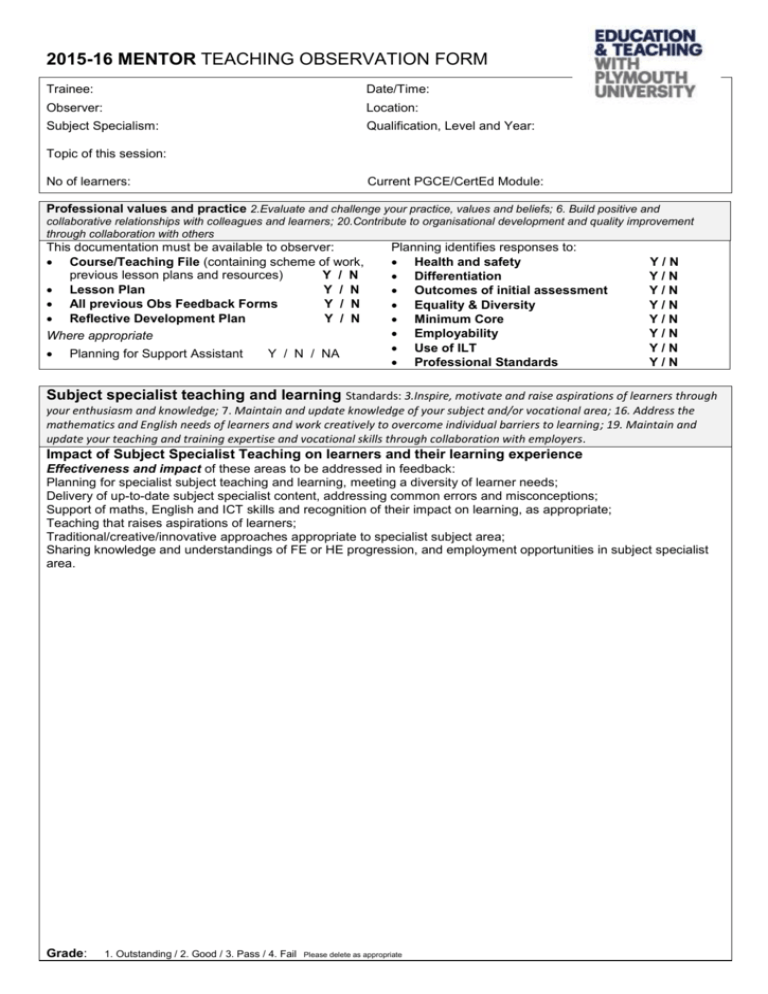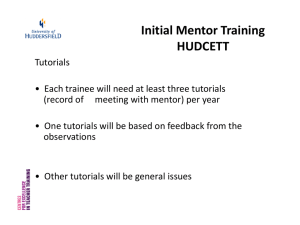2015 16 Mentor observation form
advertisement

2015-16 MENTOR TEACHING OBSERVATION FORM Trainee: Date/Time: Observer: Location: Subject Specialism: Qualification, Level and Year: Topic of this session: No of learners: Current PGCE/CertEd Module: Professional values and practice 2.Evaluate and challenge your practice, values and beliefs; 6. Build positive and collaborative relationships with colleagues and learners; 20.Contribute to organisational development and quality improvement through collaboration with others This documentation must be available to observer: Course/Teaching File (containing scheme of work, previous lesson plans and resources) Y / N Lesson Plan Y / N All previous Obs Feedback Forms Y / N Reflective Development Plan Y / N Where appropriate Planning for Support Assistant Y / N / NA Planning identifies responses to: Health and safety Differentiation Outcomes of initial assessment Equality & Diversity Minimum Core Employability Use of ILT Professional Standards Y/N Y/N Y/N Y/N Y/N Y/N Y/N Y/N Subject specialist teaching and learning Standards: 3.Inspire, motivate and raise aspirations of learners through your enthusiasm and knowledge; 7. Maintain and update knowledge of your subject and/or vocational area; 16. Address the mathematics and English needs of learners and work creatively to overcome individual barriers to learning; 19. Maintain and update your teaching and training expertise and vocational skills through collaboration with employers. Impact of Subject Specialist Teaching on learners and their learning experience Effectiveness and impact of these areas to be addressed in feedback: Planning for specialist subject teaching and learning, meeting a diversity of learner needs; Delivery of up-to-date subject specialist content, addressing common errors and misconceptions; Support of maths, English and ICT skills and recognition of their impact on learning, as appropriate; Teaching that raises aspirations of learners; Traditional/creative/innovative approaches appropriate to specialist subject area; Sharing knowledge and understandings of FE or HE progression, and employment opportunities in subject specialist area. Grade: 1. Outstanding / 2. Good / 3. Pass / 4. Fail Please delete as appropriate Further comments on subject specific teaching and/or comments on other aspects of the observed session that may relate to: Planning for learning, Assessment for learning, Promoting Inclusion, Managing teaching and learning, and Professional values and practice. Strengths and examples of good practice – 1. Reflect on what works best in your teaching and learning to meet the diverse needs of learners. Targets (with particular focus on subject specialist targets) to be incorporated into trainee’s Reflective Development Plan in their Professional Portfolio – 10. Evaluate your practice with others and evaluate its impact on learning. Observer name (print): Observation by Mentor Overall Pass / Fail 1 / Fail 2 Observer’s signature: Please circle as appropriate See attached sheet for guidance on grades in this area of observed practice. Observation grading for PGCE/Cert Ed (inc DET) 2015-16 Introduction to role of mentor as observer in this instance – We are very grateful for your support in developing your mentees’ teaching practice through their teacher training programme. The mentor role is a vital one, particularly in relation to subject specialist pedagogy. As well as demonstrating their subject knowledge, through their teaching practice, they must enable their learners to extend their depth and breadth of the subject. Your expertise in teaching your subject specialism will support your mentee in learning how to develop their skills, knowledge and understanding and evaluate the impact their teaching has on learning. Impact of Subject Specialist Teaching on learners and their learning experience: Teaching and learning develops subject specialism as well as English, mathematics, ICT and functional skills to support the achievement of learning goals and career aims Grade 1 - Outstanding Demonstration of excellent subject knowledge and pedagogy which supports and engages learners, with ability to consistently and confidently anticipate and address common errors and misconceptions. Consistent modelling of very high standards of written and spoken communication, maths and ICT, successfully developing these skills in their learners. Employment and design of creative and realistic subject specific assessment activities. Confident and consistent support of knowledge and understanding of FE/HE and relevant employment opportunities, and wider social and environmental contexts. Consistent and confident demonstration of impact on learning through adaption and advancement of subject specialist knowledge and pedagogy. Grade2 - Good Demonstration of well-developed subject knowledge, using different and engaging teaching approaches, with ability to identify, explain and address common errors and misconceptions. Modelling of good standards of written and spoken communication, maths and ICT encouraging and supporting these skills in learners. Ability to design and employ effective and realistic subject specific assessment activities. Ability to support knowledge and understanding of FE/HE and relevant employment opportunities, and wider social and environmental contexts. Demonstrates impact on learning through adaption and advancement of personal subject specialist knowledge and pedagogy. Grade 3 – Pass Application of secure subject knowledge, including accurate and consistent use of subject specific language that engages learners, develops key concepts and addresses common errors and misconceptions. Secure level of personal maths, English and ICT, building these into lessons in support of these skills in learners. Ability to employ suitable and relevant subject specific assessment activities. Ability to identify FE/HE and employment opportunities and relate these to learners. Ability to adapt subject specialist knowledge and pedagogy. Grade 4 - Fail Insufficient knowledge of specialist subject. Failure to select and apply interesting or relevant methods for teaching or assessing learner’s subject specific knowledge and skills as appropriate to the group or individual. Failure to adapt, or develop, set subject specialist knowledge or pedagogical targets






